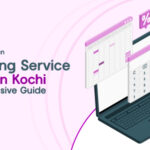How Accountants Can Tackle the Challenges of Cross-Border Transactions
In an increasingly globalized economy, businesses are expanding their horizons beyond domestic markets, engaging in cross-border transactions to tap into new opportunities. While this expansion can lead to significant growth, it also introduces a complex web of challenges that require meticulous management. Accountants, especially those offering Statutory Bank Audit Services in Kochi, play a pivotal role in navigating these challenges, ensuring that international operations are sboth profitable and compliant. This blog delves into the common hurdles of cross-border transactions and explores strategies accountants can employ to overcome them effectively.
Understanding the Challenges of Cross-Border Transactions
Before delving into solutions, it’s essential to grasp the multifaceted challenges that accompany cross-border transactions:
Currency Fluctuations: Exchange rate volatility can significantly impact the profitability of international deals.
Tax Compliance: Different countries have varying tax laws, which can complicate tax reporting and compliance.
Regulatory Variations: Navigating diverse regulatory environments requires a thorough understanding of local laws and standards.
Cultural Differences: Misunderstandings arising from cultural discrepancies can affect negotiations and business relationships.
Payment Processing: Managing international payments involves dealing with different banking systems, fees, and processing times.
Financial Reporting Standards: Aligning financial reports with multiple accounting standards can be challenging.
Risk Management: Identifying and mitigating risks such as political instability, economic downturns, and fraud is crucial.
Strategies for Accountants to Overcome Cross-Border Challenges
- Mastering Currency Management
Hedging Strategies: Implementing financial instruments like forward contracts, options, and futures can help mitigate the risks associated with currency fluctuations.
Multi-Currency Accounting Systems: Utilizing accounting software that supports multiple currencies ensures accurate bookkeeping and real-time financial analysis.
Regular Monitoring: Keeping a close eye on exchange rates and market trends allows for timely decision-making to minimize adverse effects.
- Navigating Tax Complexities
Understanding Double Taxation Agreements (DTAs): Familiarize yourself with DTAs between countries to prevent being taxed twice on the same income.
Transfer Pricing Compliance: Ensure that intercompany transactions adhere to transfer pricing regulations to avoid penalties and ensure fair taxation.
Local Tax Laws Expertise: Stay updated on the tax laws of the countries you operate in, possibly by collaborating with local tax experts.
- Ensuring Regulatory Compliance
Comprehensive Research: Conduct thorough research on the regulatory requirements of each country involved in your transactions.
Compliance Software: Leverage technology solutions that help track and manage compliance obligations across different jurisdictions.
Training and Education: Regularly train your team on international regulations and compliance standards to maintain a knowledgeable workforce.
- Bridging Cultural Gaps
Cultural Training: Educate your team on the cultural norms and business etiquettes of the countries you engage with to foster better relationships.
Local Partnerships: Collaborate with local firms or consultants who understand the cultural landscape and can facilitate smoother transactions.
Effective Communication: Utilize clear and respectful communication practices to avoid misunderstandings and build trust.
- Optimizing Payment Processing
Choosing the Right Payment Methods: Select payment options that balance cost, speed, and security, such as wire transfers, letters of credit, or digital payment platforms.
Negotiating Fees: Work with banks to negotiate favorable fees and exchange rates for high-volume transactions.
Automated Payment Systems: Implement automated systems to streamline payment processes, reduce errors, and enhance efficiency.
- Aligning Financial Reporting Standards
International Financial Reporting Standards (IFRS): Adopt IFRS to create a standardized financial reporting framework that is recognized globally.
Training in Multiple Standards: Equip your accounting team with knowledge of various accounting standards like GAAP and IFRS to ensure accurate reporting.
Consistent Documentation: Maintain consistent and thorough documentation to support financial reports across different standards.
- Strengthening Risk Management
Comprehensive Risk Assessment: Conduct detailed assessments to identify potential risks associated with each cross-border transaction.
Diversification: Spread your transactions across multiple markets to reduce exposure to any single economic or political risk.
Insurance Solutions: Utilize insurance products to protect against risks such as political instability, currency inconvertibility, and credit defaults.
Leveraging Technology for Enhanced Efficiency
In the realm of cross-border transactions, technology serves as a critical enabler for accountants:
Cloud-Based Accounting Software: Facilitates real-time collaboration and access to financial data from anywhere in the world.
Artificial Intelligence and Automation: Streamlines repetitive tasks, reduces errors, and allows accountants to focus on strategic decision-making.
Blockchain Technology: Enhances transparency and security in transactions, making it easier to track and verify cross-border payments.
Collaborating with International Experts
Accountants should not hesitate to seek expertise beyond their borders:
Local Accountants and Consultants: Partnering with professionals in target markets can provide invaluable insights into local practices and regulations.
International Accounting Firms: Engaging with global firms that have a presence in multiple countries can offer comprehensive support and resources.
Professional Networks: Joining international accounting associations and networks can facilitate knowledge sharing and access to best practices.
Continuous Education and Professional Development
The landscape of cross-border transactions is ever-evolving. To stay ahead:
Ongoing Training: Participate in courses and certifications related to international accounting and finance.
Staying Informed: Keep abreast of global economic trends, regulatory changes, and technological advancements.
Attending Conferences and Seminars: Engage with industry leaders and peers to exchange ideas and strategies.
Cross-border transactions present both opportunities and challenges for businesses operating on a global scale. The Best Chartered Accountants in Kochi are at the forefront of managing these complexities, ensuring that international operations are not only compliant but also optimized for success. By mastering currency management, navigating tax complexities, ensuring regulatory compliance, bridging cultural gaps, optimizing payment processing, aligning financial reporting standards, strengthening risk management, leveraging technology, collaborating with international experts, and committing to continuous education, accountants can effectively tackle the challenges of cross-border transactions. Embracing these strategies will not only safeguard the financial health of businesses but also pave the way for sustainable international growth.
 English
English






